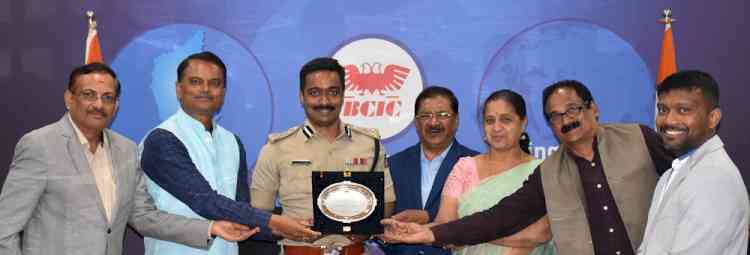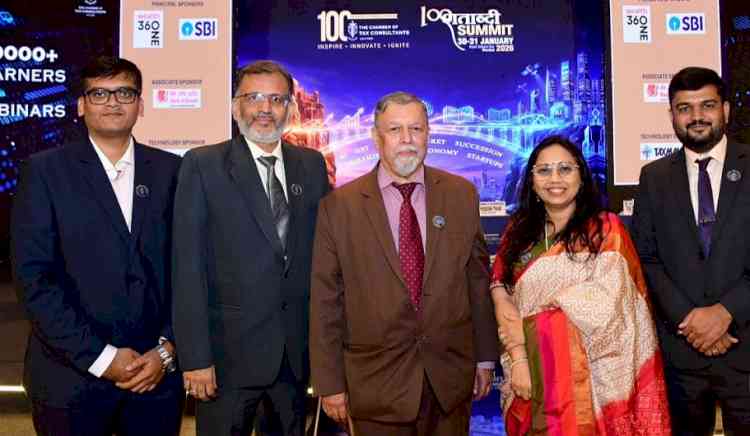BCIC Road Safety - Awareness Campaign for National Safety Month 2024
Bangalore Chamber of Industry and Commerce (BCIC) organized a Road Safety - Awareness Campaign with a special address themed ‘Road Safety - Managing Bengaluru's Traffic Challenges Tech-Driven & Collaborative Approach’ by M N Anucheth, Joint Commissioner of Police (TRAFFIC), Bengaluru City.

Bengaluru, March 12, 2024: Bangalore Chamber of Industry and Commerce (BCIC) organized a Road Safety - Awareness Campaign with a special address themed ‘Road Safety - Managing Bengaluru's Traffic Challenges Tech-Driven & Collaborative Approach’ by M N Anucheth, Joint Commissioner of Police (TRAFFIC), Bengaluru City.
The event organized during National Safety Month 2024, highlighted the various measures taken by the Bengaluru traffic police to enhance traffic management, curb accidents, and bolster road safety across the city. Mr. M N Anucheth, in his address, urged BCIC to utilize its good offices to influence Bengaluru's industrial sectors towards fostering a culture of road safety and incentivizing adherence to safety protocols while highlighting the pressing challenges faced by the city's traffic infrastructure and the various solutions that the department is working on.
In his special address, M N Anucheth, Joint Commissioner of Police (TRAFFIC), Bengaluru City said “We are currently working on implementing advanced technologies such as AI, Big Data and IOT based solutions to optimize traffic flow, reduce congestion and enhance safety. Some of the major tech enhancements and initiatives that will be implemented or are under implementation are AI based adaptive signals to reduce delays at junctions to improve safety, AI enforcement, user friendly digital platforms to report violations and check traffic updates and collaboration with research and educational institutions for innovative solutions.”
"Our primary goal is to understand the dynamics of congestion – its causes, locations, and mitigation strategies. To achieve this, we've developed ASTraM (Actionable Intelligence for Sustainable Traffic Management), a system that harnesses data from diverse sources to monitor congestion patterns. By categorizing traffic flow into moderate, high, and severe, we can promptly respond to the situation. Certain junctions like Hebbal, witness severe congestion consistently; for instance, Hebbal witnesses a staggering 90,000 vehicles passing through in a three-hour window from 9:00 am to 12 noon, likely one of the highest globally. Leveraging our advancements, we can now disseminate real-time road conditions via map-based services, FM radio, and social media platforms to mitigate traffic congestion," Mr. M N Anucheth added.
Dr. S Devarajan, President-BCIC said “The significant improvement in the city's traffic as a result of several initiatives undertaken by the Bengaluru Police is commendable, and BCIC is fully supportive of the traffic police across all fronts. BCIC is committed to partnering with all our members to enhance last-mile connectivity, thereby promoting the usage of metro services among employees, an effort that could result in reduced vehicular presence on the roads."
“The ever-increasing traffic congestion in Bengaluru is posing a great challenge to the traffic management system in the city. Bengaluru currently has the largest number of privately owned vehicles for any city in India. Today, Bengaluru has a population of 14 million people, with a traffic density of 827 vehicles per 1000, which is the highest for any Indian city. The vehicle to population ratio is 1:1 and it is growing exponentially. This year Bengaluru witnessed 429 fatal accidents out of which 10% of the total fatalities were at Devanahalli due to the high speeds on the elevated corridor, this is followed by Kengeri due to the NICE road. Last year, among the 914 fatalities, 74% were riders of two-wheelers, while 21% were pedestrians. Alarmingly, 60% of those affected were aged 60 or above” M N Anucheth explained.
During the interactive session, BCIC members shared their thoughts and concerns about traffic in the city. They gave suggestions and talked about problems and offered viable solutions.



 City Air News
City Air News 










